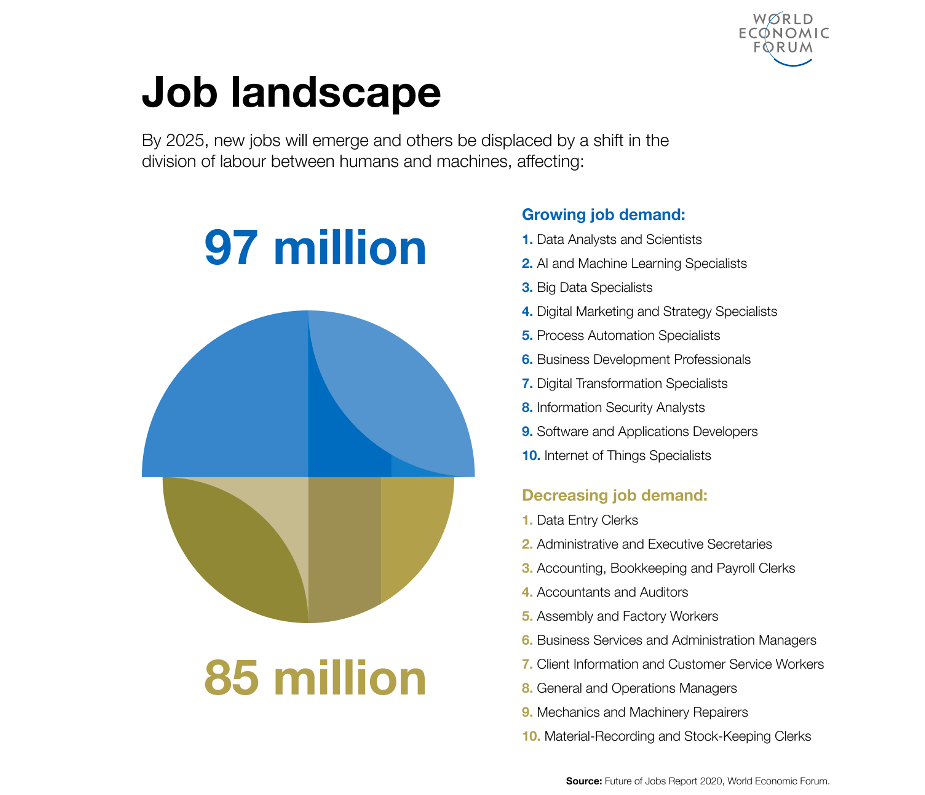
It is no secret that the digital and technological acceleration is transforming the labour market. In fact, according to the framework that McKinsey and Company have developed for the pace of automation adoption, 22 percent of current work activities (equivalent to 53 million jobs) could be automated by 2030, assuming a midpoint scenario.
According to the World Economic Forum’s Future of Jobs Report 2020, easily automated jobs such as Data Entry Clerks, Administrative secretaries and Accountants will decrease in demand, whilst there will be a growing demand for roles such as Data Analysts and Scientists, Big Data Specialists, Internet of Things Specialists and Information Security Analysts. They expect that by 2025, 12.000.000 additional new jobs will be created. However, this increase in job creation signifies that more than half of Europe’s workforce will face significant transitions. Automation will require all workers to acquire new skills. About 94 million workers may not need to change occupations but will need retraining and upskilling, given that technology handles 20 percent of their current activities.

3 future areas to upskill in:
1. Data
2. Internet of Things
3. Cybersecurity
1. Data
High demand for data professionals
Data has been and will continue to be a top future area to work in as there is plenty of opportunity. According to Peter Bailis, CEO of Sisu, while there will always be new and nifty machine learning techniques – data analysts/architects/engineers/scientists will usually find better results by focusing their efforts on leveraging the data they already have on hand. What’s more, according to a study by LinkedIn, there has been a 650% job growth in data science since 2012 and the U.S. Bureau of Labour Statistics estimates the creation of 11.5 million new jobs by 2026. So the demand across the world for these data-related jobs is not slowing down, and the lack of competition for these jobs makes it a very lucrative option for a career path.
How to get started in the field of data
Universities continue to add data-related programmes to their curriculums. According to DataScience Programs, there are more than 830 separate data science programs being offered from about 500 universities around the world and a ‘Masters of Data Science’ is the most popular degree offered. The path to data scientist success involves a good amount of studying and certain academic areas such as computer studies, economics, finance, business studies, statistics, and mathematics will make your entry into this field easier.
Skills needed for data science
When starting a data-related job it is important not to spend too much time on theory, practical application is necessary for learning.
The basic skill set you must acquire in order to be competitive in the data science job market, for example, are as follows:
- Excel proficiency;
- Statistics knowledge;
- Maths understanding (specifically calculus and algebra – the subfields that are heavily employed in data science);
- Good command of programming languages, such as SQL, Python, and R;
- Ability to work with visualization tools (e.g. Tableau)
- finally Machine learning and deep learning fundamentals
If you’re starting from scratch, you can master these data science skills via enrolling in a qualification program or study with private tutors or alternatively, an online certificate program could be the best start of your professional journey. On the other hand, data scientists looking to excel in the marketplace will still need to have a solid understanding of the basics, including data modelling, relational databases, and basic statistics. These are critical skills that are likely to survive any future shifts in data science job functions, whilst knowledge of data storage techniques along with the basics of big data will also make you more favourable.
Data job roles and salaries
- Salary Range for Data Scientists (According to Glassdoor)
- The average salary for a data scientist is €93,400 per year.
- The average salary for a young professional can be as high as €78,220 per year.
- Data scientists with 1 to 4 years of experience can earn around €106,009 per year,
- The average salary for those with more experience can increase to an average of €135,856 per year.
- Data Analyst Salary Range
- A junior data analyst earns around €57,636 per year,
- An experienced senior data analyst can expect to be paid approximately €88,101 per year.
- Data Engineer Salary Range
- The average salary for a data engineer in the United States is €84,695.
- Renowned companies such as Amazon, Airbnb, Spotify, Netflix, and IBM value and pay high salaries to data engineers.
- Entry-level and mid-range data engineers earn an average salary of between €90,571 and €113,436 per year.
- However, with experience, a data engineer can earn up to €127,623 a year.
2. Internet of Things (IoT)
High demand for IoT professionals
The Internet of Things (IoT) refers to the rapidly growing network of connected objects able to collect and exchange data using embedded sensors. IoT is becoming increasingly more important nowadays and is growing at an exponential rate, in fact, in 2021, there are more devices connected to the Internet than people and the gap continues to grow, devices such as smart home devices (Amazon Echo) or wearables (Apple Watch/FitBits) or contactless and passwordless interactions using Internet of Things sensors The last year ended with 4 billion Internet users worldwide, while the Internet of Things included 7 billion devices. It is also expected that by the end of 2021, the number of connected devices will reach 10 billion.
How to get started in IoT
If you would like to start a career in IoT and learn more about AI & Machine learning you should take a look into: IIIT-B & upGrad’s PG Diploma in Machine Learning & AI which is designed for working professionals and offers 450+ hours of rigorous training, 30+ case studies & assignments, IIIT-B Alumni status, 5+ practical hands-on capstone projects & job assistance with top firms.
Top 10 in demand IoT skills to master
- Machine learning and Artificial Intelligence
- JavaScript and Python
- Knowledge about how sensors work
- UI-centric Approach
- Node.js Development
- Big Data
- Security
- GPS systems
- Cloud Computing
- Mobile Hardware environment
Most popular roles in IoT, average annual salary
- IoT/Cloud Software Developer – Annual salary: $73,000
- IoT Infrastructure Architect – Annual salary: $100,000
- IoT Systems Administrator – Annual salary: $72,000
- Vulnerability/Cyber Engineer – Annual salary: $84,000
- Test Engineer – Annual salary: $62,000
3. Cyber Security
High demand for cyber security professionals
Cyber Security is going to be one of the top future areas to work in; with an ever-expanding scope, cybersecurity presents the ultimate growth potential—both in your career path and for learning opportunities. There has been a 350 percent growth in open cyber security positions from 2013 to 2021. What’s more, out of the 3.5 million open cyber security positions expected by 2021, it has been estimated that there will be more than 2 million openings in the Asia-Pac region, and nearly 400,000 will be in Europe.

How to get started in cyber security
If you are looking for a way to get started in the world of cyber security, you need to look into ElevenPaths. ElevenPaths, Telefónica Group’s global cyber security company, has developed different training paths in cyber security. The company, which focuses on prevention, detection and appropriate response to reduce attacks, protect its digital services and ensure cyber resilience, is now leveraging its expertise to upskill.
Cyber Security skills – new threats require new skills
- Application Development Security
- Cloud Security
- Risk Management
- Threat Intelligence
- Incident Response
- Compliance and Controls
- Data Privacy and Security
- Access Management
- Security Strategy and Governance
- Health Information Security

Entry-level cyber security jobs and salaries
– Cyber Security Specialist / Technician
- Key skills and knowledge requested: information security, information systems, information assurance, network security, security operations, vulnerability assessment, project management, Linux, NIST cyber security framework
- Top certifications requested: CompTIA Security+, Certified Information Systems Security Professional (CISSP), SANS/GIAC Certification, Certified Information Systems Auditor (CISA), Certified Information Security Manager (CISM)
- Average salary: $92,000
– Cyber Crime Analyst / Investigator
- Key skills and knowledge requested: computer forensics, Linux, information security, consumer electronics, hard drives, information systems, forensic toolkit, UNIX, malware engineering
- Top certifications requested: SANS/GIAC Certification, CISSP, EnCase Certified Examiner (EnCE), GIAC Certified Forensic Analyst, GIAC Certified Incident Handler (GCIH)
- Average salary: $94,000
– Incident Analyst / Responder
- Key skills and knowledge requested: information security, project management, information systems, Linux, network security, technical support, intrusion detection, UNIX, security operations
- Top certifications requested: CompTIA Security+, CISSP, SANS/GIAC Certification, GIAC Certified Incident Handler, IT Infrastructure Library (ITIL) Certification
- Average salary: $89,000
– IT Auditor
- Key skills and knowledge requested: internal auditing, audit planning, information systems, Sarbanes-Oxley (SOX), accounting, risk assessment, information security, COBIT, business process
- Top certifications requested: Certified Information Systems Auditor (CISA), CISSP, CISM, ITIL, Information Systems Certification
- Average salary: $98,000
– Other cyber security jobs include:
- Cyber Security Engineer – $99,000
- Cyber Security Analyst – $96,000
- Cyber Security Consultant – $91,000
- Cyber Security Manager/Administrator – $103,000
- Systems Engineer – $99,000
- Network Engineer/Architect – $112,690
- Software Developer/Engineer – $107,510
- Vulnerability Analyst/Penetration Tester – $104,000
The moral of the story is that…
…many of today’s jobs are in danger of being replaced by AI due to the advancement in technology and automation. Upskilling and reskilling will be ever more important for the future of work and the new skills acquired will help professionals to stand out from the crowd and give them a competitive advantage, which will ultimately narrow the skills gap and fill more positions in roles such as Data, Internet of Things and Cyber Security. Finally, pursuing a career in these areas will be a strategic move, given that the two key logistical advantages for certain careers such as cybersecurity are low to no unemployment and solid compensation.




